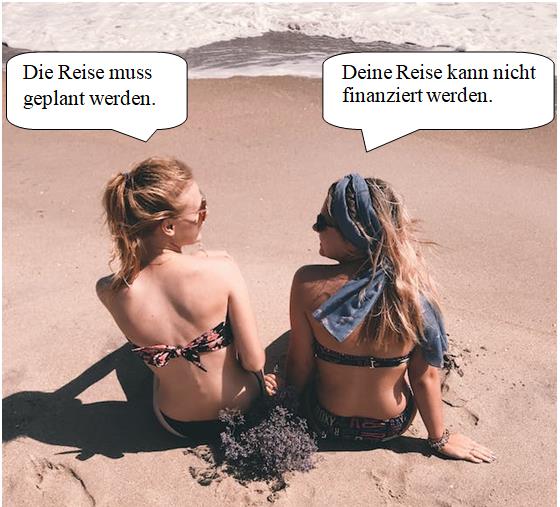In this lesson you will learn all about subjunctive II with modal verbs, how they are formed and when we use them.
Thank you for reading this post, don't forget to subscribe!CONTENTS
What is Subjunctive II
Subjunctive II with Modal Verbs
Modal verbs können, sollen and müssen
Können, sollen and müssen in the subjunctive II present tense
Past tense
Past Tense Subjunctive II with Modal Verbs – Tables
Dependent clauses – Tables
What is Subjunctive II
A little reminder why the subjunctive II is used in German: The subjunctive II is used to express politeness, when we ask or request something. We will get what we are looking for sooner if we use the subjunctive II. We can also use it when we want to express assumptions, guesses, wishes, when giving advice, etc. As you can see, the subjunctive II can be of great use to us in the German language
Click on:
Grammar Contents
Subjunctive II with Modal Verbs in the Present Tense
The present tense of the subjunctive II modal verbs corresponds to the preterite indicative forms. Unlike the preterite indicative, müssen, können, dürfen and mögen get the II Umlaut, two dots on the vowels, in the subjunctive.
For example:
Modal verbs
| Past tense Indicative | Subjunctive II |
| ich konnte du musstest er durfte wir mochten | ich könnte du müsstest er dürfte wir möchten |
The endings are the same in the past tense indicative and in the subjunctive II
| Past tense konnte | Subjunctive II könnte |
| ich konnte du konntest er, sie, es konnte wir konnten ihr konntet sie/Sie konnten | ich könnte du könntest er, sie, es könnte wir könnten ihr könntet sie/Sie könnten |
The modal verbs sollen and wollen do not take the Umlaut in the II subjunctive.
For example:
| Past tense Indicative | Subjunctive II | Past tense Indicative | Subjunctive II |
| ich sollte du solltest er, sie, es sollte wir sollten ihr solltet sie/Sie sollten | ich sollte du solltest er, sie, es sollte wir sollten ihr solltet sie/Sie sollten | ich wollte du wolltest er, sie, es wollte wir wollten ihr wolltet sie/Sie wollten | ich wollte du wolltest er, sie, es wollte wir wollten ihr wolltet sie/Sie wollten |
Modal verbs können, sollen and müssen
If you use these three verbs in the second subjunctive, you can give advice and recommend.
For example:
Du solltest im Bett bleiben. Du bist krank.
Du könntest dich mal um sie kümmern.
Du müsstest hier vorsichtiger fahren, es ist hier rutschig.
With können in the subjunctive II we generally make suggestions or polite requests. And with sollen or müssen when we want to recommend something important to someone.
For example:
Wir könnten uns ja mal wieder treffen!
Wir könnten morgen ins Kino gehen.
Du könntest ihr Blumen schenken.
Könnte ich bitte noch eine Tasse Kaffee haben?
Könnten Sie mir helfen?
Können, sollen and müssen in the subjunctive II present tense
| Infinitive: können Past tense: konnte | Infinitive: sollen Past tense: sollte | Infinitive: müssen Past tense: musste |
| ich könnte du könntest er/sie/es könnte wir könnten ihr könntet sie/Sie könnten | ich sollte du solltest er/sie/es sollte wir sollten ihr solltet sie/Sie sollten | ich müsste du müsstest er/sie/es müsste wir müssten ihr müsstet sie/Sie müssten |
Note to the 1st and 3rd person singular, the endings are the same. Likewise, the 1st and 3rd person plural, endings are the same. The form in the subjunctive II is almost the same as in the past tense. The only difference is that in subjunctive II we add Umlaut (ä, ö, ü).
Past tense
There is only one Past Subjunctive 2. People often use Past Subjunctive 2 with Modal Verbs to express their regret/sympathy for a past situation. They are also used to subsequently criticize a past situation/action.
We form the subjunctive II with the modal verb in the past with the auxiliary verb haben in the subjunctive II and with the main verb and the modal verb in the infinitive.
In the main clause, the auxiliary verb comes before the main and modal verbs.
In a dependent clause, the order remains the same.
The auxiliary verb always comes immediately before the main and modal verbs
For example:
Mein Sohn hat die Fahrprüfung nicht bestanden. – My son did not pass his driving test.
Er hätte mehr für die Fahrprüfung lernen müssen. – He should have studied more for the driving test.
Wir haben den Zug verpasst. – We missed the train.Wir hätten früher von zu Hause weggehen sollen. – We should have left home earlier.
Modal verbs form the past subjunctive II with the auxiliary verb haben in the subjunctive II and the double infinitive. The modal verb is placed at the end of the sentence.
hätten + INFINITIV + MODAL VERB INFINTIVE
For example:
Past tense: Jasna musste gestern zum Arzt gehen.
Perfect tense: Jasna hat gestern zum Arzt gehen müssen.
Subj.II with modal verbs: Jana hätte gestern zum Arzt gehen müssen.
The subjunctive II indicates the opposite of the indicative !!! In the perfect and past tense (indicative), Jana went to the doctor. In the past subjunctive II, Jasna did not go to the doctor but she should have gone!!!
The subjunctive is obligatory in constructions with the modal verbs müssen, sollen and nicht dürfen, which indicate an unfulfilled request. These constructions usually occur only with the meaning of the past tense in the plusquamperfect.
For example:
Sie hätte rechtzeitig bremsen müssen.
Du hättest nicht so viele Fehler machen dürfen.
Modalni glagoli formiraju prošli konjunktiv II sa oblikom hätte, infinitivom glagola i infinitivom modalnog glagola.
For example:
Er hätte es wissen müssen. – He should have known that.Sie hätte auch später kommen können.- She could have come later.
In a dependent clause, hätte always appears before the infinitive of the verb and the infinitive of the modal verb.
For example:
Die Lehrer sagte, dass er es hätte wissen müssen.
Click on:
Grammar Contents
Past tense of subjunctive II with modal verbs – Tables
Pay attention to the position of the verb. All verbs are colored blue.

Dependent clauses – Tables
Pay attention to the position of the verb. All verbs are colored blue.

See more:



